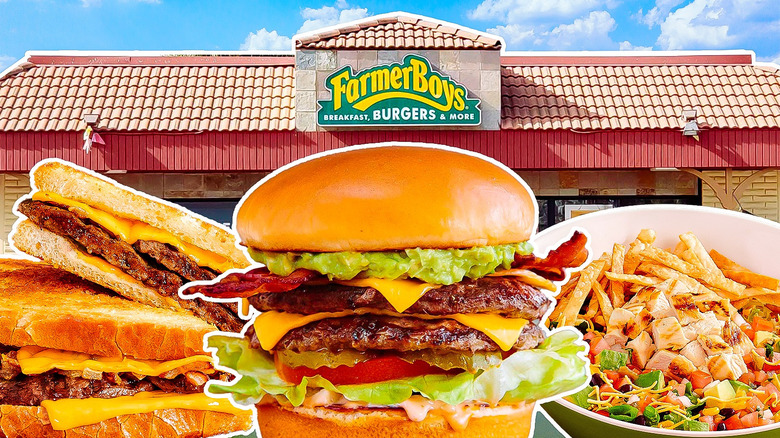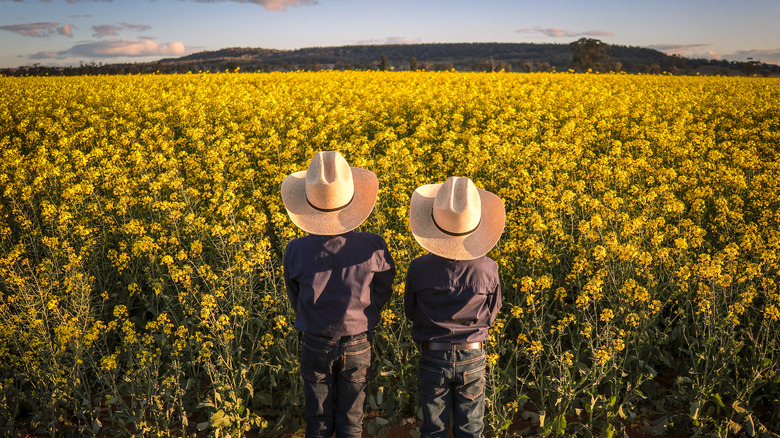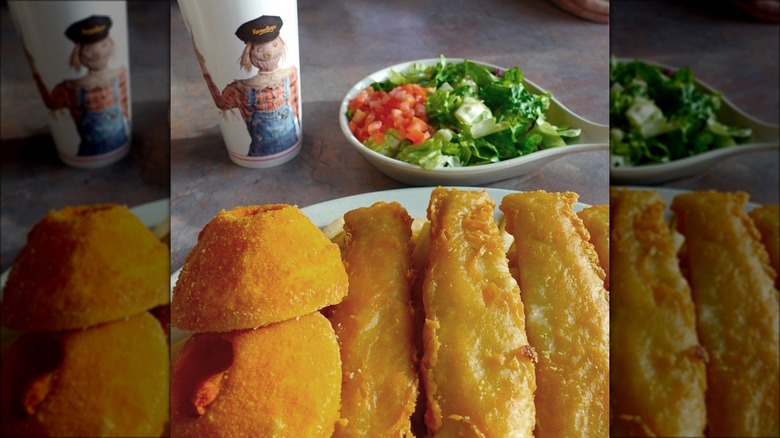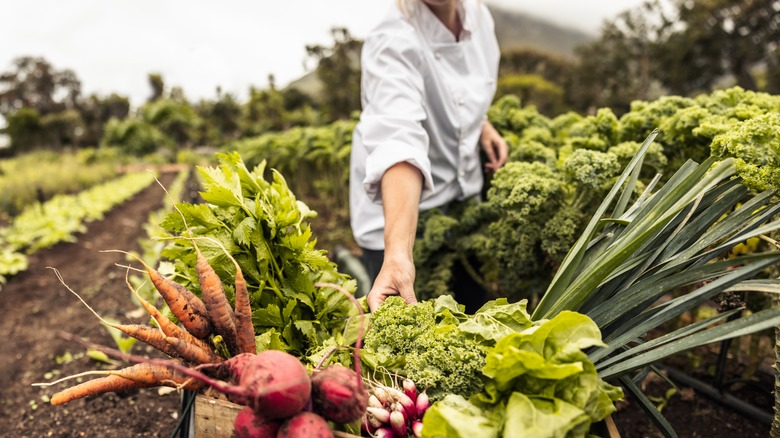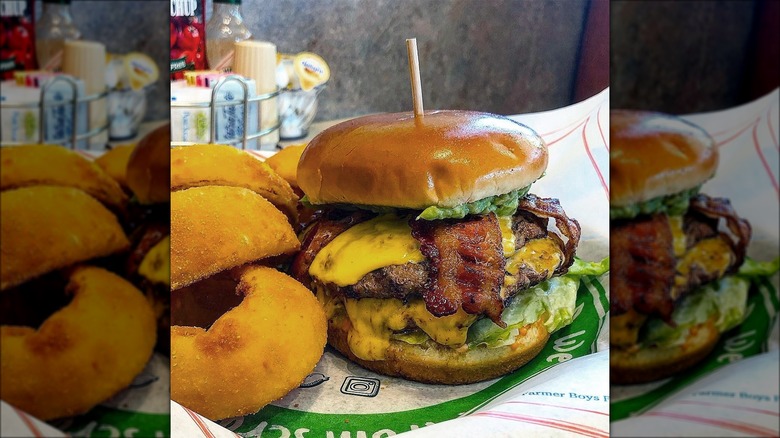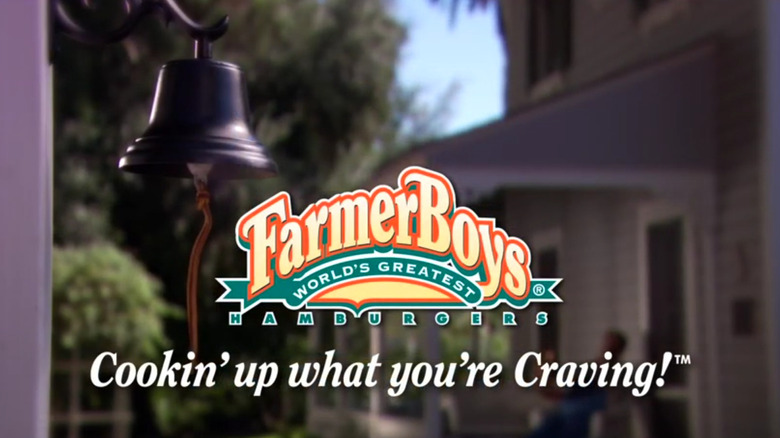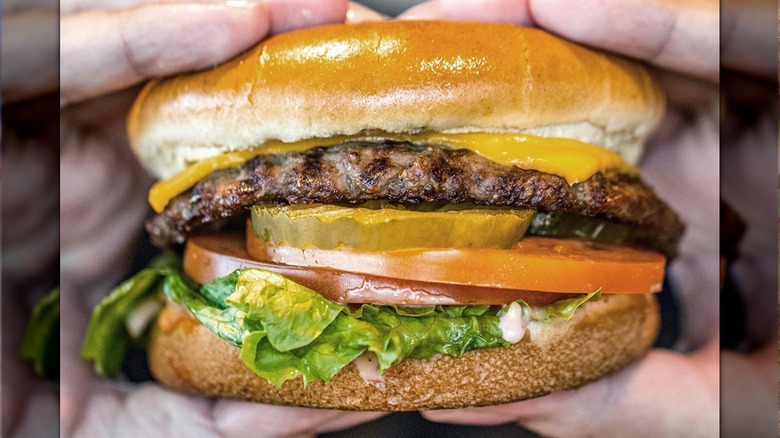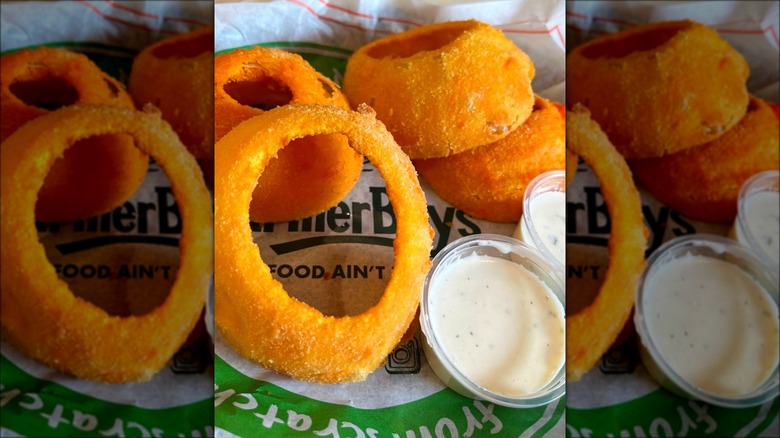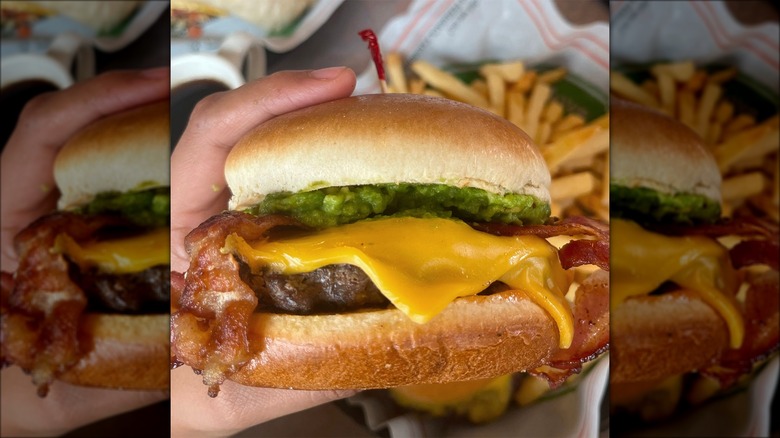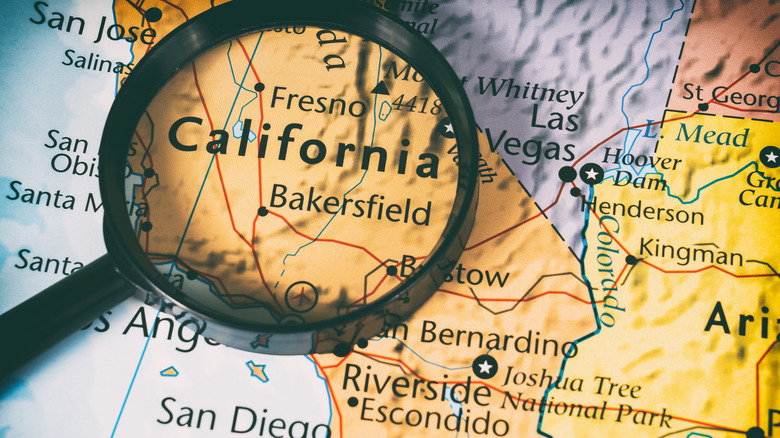What Farmer Boys' Biggest Fans Might Not Know About The Burger Chain
Farmer Boys restaurants occupy a unique place in the fast-casual restaurant landscape. Not exactly Denny's and not exactly McDonald's, the chain exists in that dreamy twilight where you can order at the counter and then eat with utensils that require washing instead of tossing at the end of the meal. The food looks and tastes as wholesome as the shiny red farm trucks that dominate the chain's TV commercials, too.
If you didn't know any better, you'd swear that Farmer Boys cropped up in the middle of a Kansas road on the way to Oz. Everything about its brand says that it's been run by generation after generation of an American farm family, with its restaurant just a side gig for the real work of farming the fresh vegetables that sit on top of its made-to-order burgers.
But while the wholesome, community-forward image isn't a facade, the chain gets its roots not from Oz but from a family farm in Mediterranean Cyprus. The brothers who started the restaurant 40-plus years ago came to the U.S. in pursuit of the American dream. For fans of Farmer Boys, all these interesting facts may come in a distant second to the fact that it plain makes the best burger in town. But for those who are now sufficiently intrigued about the real story behind Farmer Boys, take a seat, tuck a napkin into your shirt collar, and get ready to learn some utterly delish things about this fast-growing burger franchise.
The five founders came from a restaurant family
With its scarecrow mascot, hamburgers, and emphasis on fresh ingrediets, you'd think that the idea for Farmer Boys Restaurants hatched out the brain of an very American writer like Laura Ingalls Wilder or L. Frank Baum. But while nods to American culture run deep within the restaurant, the five Havadjias brothers bring something different to the table. The brothers (Demetris, Chris, George, Harry, and Makis) do, indeed, come from a restaurant family — a Greek Cypriot restaurant family. They spent their youth working in their father's and grandfather's restaurant on Cyprus before three of the brothers (Chris, Harry, and Makis) came to America to further their educations.
According to Chris, part of the appeal of the first Farmer Boys restaurant in Perris, California, was that its roadside location on a lone highway reminded him of his family's restaurant back home. While a Greek family starting an all-American chain restaurant may put them just this side of unusual, the fact that they opened a restaurant at all isn't so odd. Almost 30% of immigrants or their children become restaurant owners, according to the National Restaurant Association (via WBUR).
The restaurant that became Farmer Boys was a truck stop
When the Havadjiases opened their first restaurant, it first earned a reputation as primarily a truck stop. Named McCoy's, the place served fish and chips and hamburgers. It's likely that the restaurant's location along the highway, along with the fresh food the brothers served, appealed to hungry truck drivers in need of a solid meal and some company to break the monotony of being on the road. For truckers, the restaurant's license for beer and wine turned dinner after work into a beer break with the locals.
However, as the restaurant began to grow, the powers that be found it necessary to update the menu. Changing out menu items remains one of the chief ways that a restaurant can stay competitive. Aside from the fact that food trends spark changes in customer preferences, food availability and changing prices often force menu changes. In the restaurant industry, it's not uncommon to see menu changes two to four times a year. Many, like Farmer Boys, also do it to tighten their brand image.
The original menu featured Greek-American diner fare
For many immigrant restaurant owners in the U.S., serving food from their homeland offers a way to stay connected with their culture while still allowing them to pursue their entrepreneurial dreams. In most respects, the Havadjiases also embraced this practice when they opened the doors of their first diner-style restaurant.
However, one aspect of the restaurant business remained culturally Greek for the family: sociability. Their restaurants offered a place for customers to linger and connect with one another. By some accounts, their first restaurant was a place where local truckers liked to come and hang out, even after their dinner plates had been cleared away. The diner-like atmosphere of the brothers' first restaurants encouraged a sense of community, a vibe that remains at the Farmer Boys restaurants today. In fact, the Greek word "philoxenia," meaning "friend to the stranger," is still the restaurant chain's motto.
It embraced the clean food movement early on
Back in 2004, the documentary "Super Size Me" purportedly showed us what would happen to someone who only consumed highly processed McDonald's food for a month. Filmmaker Morgan Spurlock gained nearly 20 pounds during filming, sparking more than a few conversations about highly-processed fast food. In light of the film's notoriety, logic would dictate that burger chains like Farmer Boys would incorporate clean food principles into their menus as part of a marketing schtick. This isn't the case. When the Havadjiases opened McCoy's (the precursor to Farmer Boys) in the early 1980s, they embraced the principles of the clean food movement long before the concept of clean eating became a thing.
Their daily routine included chopping up all the ingredients for fresh salad. They tapped farmers and ranchers close to their Perris restaurant whenever they could to get unprocessed raw supplies. Fries were derived from Washington and Oregon potatoes, orange juice from California oranges, coffee from local producers, and eggs came from Arizona. These are among the regional ingredients the chain still uses in its daily food orders. At Farmer Boys, then and now, it was never necessary to dive deep into wonky food chemistry to get made-to-order goods out to the public.
It doesn't use frozen beef in its hamburgers
From a production volume standpoint, fast food burger joints that use frozen beef to make burgers are onto something. McDonald's sells millions of burgers a day, which is thanks in part to its use of frozen patties to keep the assembly line going. Literally: the McDonald brothers took a page out of automotive manufacturer Henry Ford's playbook when they created their burgeoning burger empire.
Farmer Boys set itself apart from the beginning by buying fresh beef for its burger. For the brothers, grinding their own hamburger meat allowed them to ensure that each freshly-made burger tasted its best every time it was ordered. To many, no assembly line could create the same kind of taste as a made-to-order burger. But there's more to the fast-casual chain's burger than being fresh. Farmer Boys opts to buy meat that contains no hormones or antibiotics.
It took less than 24 years to open 50 restaurants
While the Farmer Boys chain remains smaller than its famous fast food rivals, no one can say its growth has moved at a snail's pace, either. From the time it opened in the early 1980s until it moved into franchising in the late '90s, the chain went from one store to 50.
Since that time, Farmer Boys has opened more restaurants, and the count, as of this writing, stands at 100 stores. Thus far, the chain has spread from California, its original stomping (or cooking) grounds, to Nevada and Arizona as well. The chain has plans in the works to open another 50 restaurants over the next five years.
Its franchising plans have moved a bit slower than McDonald's did, which saw its 100th store open just 11 years after the chain's inception. McDonald's also took several years to settle on the type of restaurant it would be, just as Farmer Boys did.
National Cheeseburger Day is a big deal for the chain
For burger chains like Farmer Boys, National Cheeseburger Day kinda equals Independence Day. It counts as the day when burger-lovin' foodies get to celebrate all things burger by slathering their favorite meal with ketchup, mustard, pickles, and a few onion slices for good measure. But Farmer Boys doesn't settle on just having a good $2 burger sale for National Cheeseburger Day (though it has been known to do that, too).
Oh no. It's all about going big or going home with this chain. In 2020, the chain introduced its Bourbon Bacon Cheddarburger. That bourbon flavor was probably a bonus during the lockdowns, but that's not where this burger joint left things. Instead, it created a bourbon-flavored barbecue sauce to top its Tillamook-smothered burger. The chain ran the cheeseburger special from September to November of that year, ensuring that it not only celebrated National Cheeseburger Day on September 18th but that it kept the spirit going until the holiday season was ready to commence. Now, that's a cheeseburger special!
Must-try items include fried onion rings and zucchini
It's not that you can't get French fries with a delectable Farmer Boys hamburger or cheeseburger. Rather, it's just that you can get so much more with your burger. More specifically, you should try the chain's fried onion rings and zucchini strips. Of course, all those items come fresh from one of the restaurant's farmer partners. Furthermore, both the zucchini and the onion rings are cut and battered daily to ensure that they're as delicious from the first bite to the last. Customers rave about the zucchini, while the onion rings have been subject to some generous promos on National Onion Ring Day. Can you say "Free onion rings in June, please?" We sure can!
Farmer Boys fans can order the fried zucchini strips or the onion rings as sides to any dish. They can also dive into an order of each and call it lunch. Any way you slice 'em and eat 'em, these are just plain yummy fun.
August 25th is Farmer Boys Day
For many people, late August means there's one more chance for a last hurrah before summer ends. It represents a time to sneak in one more weekend beach trip, one more lazy Saturday in bed, and one more late night out with friends. But for the folks at Farmer Boys, each passing August represents not an end but a beginning. August 25th marks the day that Farmer Boys came into existence. To celebrate, the late-summer date was recently designated Farmer Boys Day. In 2021, the fast-casual chain celebrated its 40th anniversary by declaring the date a red letter day in the company's history.
However, this celebration didn't just represent the Farmer Boys' powers-that-be declaring the date to be important. Both the Clark County, Nevada Board of Commissioners and the Riverside, California Board of Supervisors were on hand to officially celebrate the anniversary.
Chris Havadjias was especially excited about the designation because it demonstrated the important role that Farmer Boys plays in its community. Aside from being a local hangout that serves some of the best cheeseburgers anywhere, the Farmer Boys chain restaurants represent a first-job milestone for many of the youth in the area.
It's won numerous awards for its food
While humans like to think that they do everything of their own volition, the fact is we often turn to sources like social media and review websites because they provide guidance in times of uncertainty. While it's nobody's business how we spend our money, we feel inclined to justify purchases because often the human we need to convince the most is ourselves.
Deciding where to go for dinner can throw us into just such a frenzied state of existence, particularly if we feel like we've been run over by a truck after a long day at work. That's why we love to eat at restaurants that rack up awards, like Farmer Boys. As of this writing, the chain boasts more than 50 community awards, ranging from "Best Burger" to "Best Takeout." At the same time, the designation as one of the "Top 100 Movers & Shakers in 2021" by Fast Casual represents industry-level proof that the chain is good.
It has restaurants in just a few states
In recent years, independent restaurants have met with failure as the COVID-19 pandemic has taken its toll. By all appearances, chain restaurants represent the wave of the future due to their ability to adapt to these changes, like a customer base that wants more takeout. The pandemic also affected dining room sales, made some things like alcohol sales less reliable, and caused an even greater cash shortfall. Some restaurant industry experts even predict that the restaurant industry will never see pre-pandemic levels of business again.
Amidst all this turmoil, Farmer Boys thrived during the pandemic and the years that followed. In 2020, it opened four restaurants, including taking its wares to Arizona. Additionally, as of 2023, this chain with the scarecrow mascot plans to open another 50 establishments within the next five years, with locations planned for Oregon, Utah, and Colorado. Currently, its restaurants can be found in the chain's home state of California, as well as Arizona and Nevada. While the chain may face supply chain issues, the Farmer Boys expansion plans include workarounds for that possibility.
The chain changed its name for Women's History Month
The year 2020 was significant for Farmer Boys, and not just because the restaurant opened four more stores despite downturns in the restaurant business. In March of that year, the chain also left its mark by temporarily changing its name in from Farmer Boys to Farmer Girls to celebrate both Women's History Month and International Women's Day in grand style. While the name change wasn't permanent, it represented the important contributions that women have made to the fast-casual chain. Seventy-five restaurants displayed a new logo featuring the change on their front doors. A new menu item, the Bacon Girl Burger, was also rolled out as part of the celebration.
Farmer Boys – err, Girls – stands as something of an anomaly in the restaurant industry. While most people working in the restaurant field are female, the vast majority of them do not hold posts in the very upper ranks of management. Even before Women's History Month, the restaurant chain embraced women as leaders. Currently, the restaurant's Chief Financial Officer (CFO), Judy Lewis, and the Chief Operating Officer (COO), Karen B. Eadon, are women. The chain also boasts nearly 300 female managers and employees. What's more, over 27% of its franchises are headed by women.
